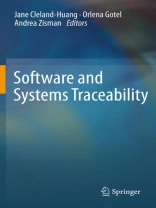Software and Systems Traceability provides a comprehensive description of the practices and theories of software traceability across all phases of the software development lifecycle. The term software traceability is derived from the concept of requirements traceability. Requirements traceability is the ability to track a requirement all the way from its origins to the downstream work products that implement that requirement in a software system. Software traceability is defined as the ability to relate the various types of software artefacts created during the development of software systems. Traceability relations can improve the quality of a product being developed, and reduce the time and cost of development. More specifically, traceability relations can support evolution of software systems, reuse of parts of a system by comparing components of new and existing systems, validation that a system meets its requirements, understanding of the rationale for certain design and implementation decisions, and analysis of the implications of changes in the system.
Mục lục
Traceability Fundamentals.-Cost‐benefits of Traceability.-Acquiring Tool Support for Traceability.-Information Retrieval Methods for Automated Traceability Recovery.-Factors Impacting the Inputs of Traceability Recovery Approaches.-Automated Techniques for Capturing Custom Traceability Links across Heterogeneous Artefacts.-Using Rules for Traceability Creation.-Ready‐to‐use Traceability on Evolving Projects.-Evolution‐driven Trace Acquisition in Eclipse‐based Product Line Workspaces.-Traceability in Model‐Driven Engineering: Efficient and Scalable Traceability Maintenance.-Traceability in Agile Projects.-Traceability between Runtime and Development time Abstractions.-Tracing Non‐functional Requirements.-Medical Device Software Traceability.-The Grand Challenge of Traceability (v1.0).-Appendices.












